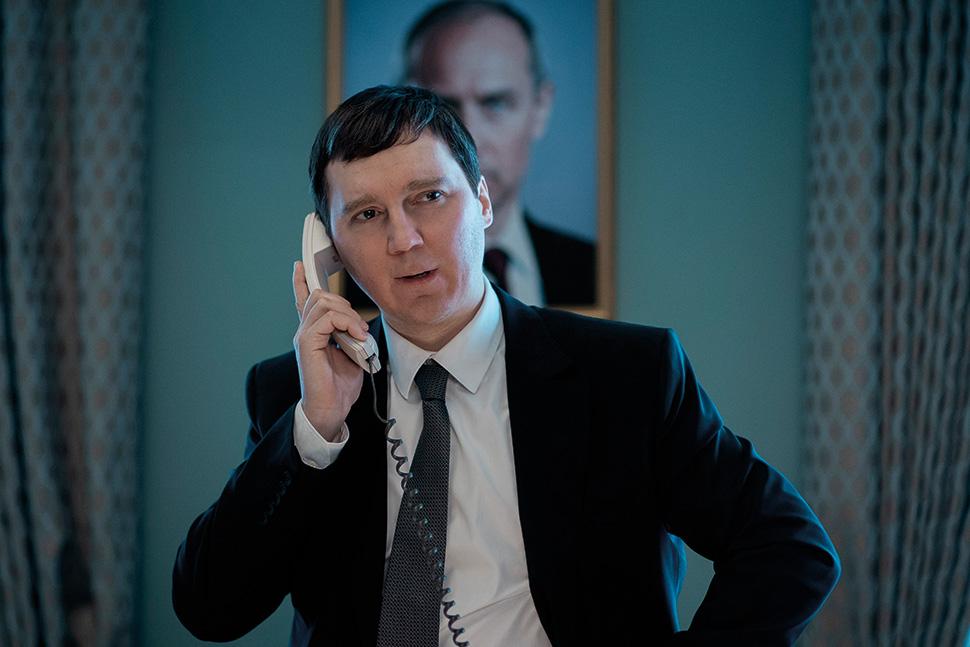The Wizard of the Kremlin
Le Mage du Kremlin
VERDICT: Russian history whips by onscreen in Olivier Assayas’s often fascinating, at times clumsy English-language drama ‘The Wizard of the Kremlin,’ detailing the rise of Putin (Jude Law) and authoritarian power through the eyes of a brilliant, unscrupulous young ideologue.
A man’s irresistible rise to power through foul and amoral means has motivated many a great tragedy, and The Wizard of the Kremlin (Le Mage du Kremlin) clearly has big aspirations in this direction for its two main characters. It is the chilling story of a gifted young avant-garde theater director, Vadim Baranov (Paul Dano, The Batman), who becomes the advisor and chief ideologue to Vladimir Putin, played by Jude Law with gravitas and charisma. (Vadim is fictional but seems closely based on Vladislav Surkov, who advised Putin in the 2000’s.)
Based on a novel based on reality, director Olivier Assayas and his co-screenwriter Emmanuel Carrère mix fiction and history freely, beginning with the over-used framing device of an American journalist on a visit to Moscow in 2019, who becomes privy to all manner of state secrets. The fact that the dialogue is in English in a variety of accents presents the viewer with one more barrier to the suspension of disbelief.
Despite these annoyances, it marks a change of pace for Assayas after such diverse films as Personal Shopper and Suspended Time and offers an original approach to talking about the Russian Federation. The tale of oligarchs, money and power should exert a strong fascination for Russophiles, with crossover interest for those obsessed with present-day politics and the influence that cynically manipulated media have on public opinion. Taking the audience behind the scenes of international intrigue and world events, the film could well find niche audiences after its bow in Venice competition.
Though retired from politics as the film begins, Vadim must still have his ear to the ground, because he becomes immediately aware of the American writer (Jeffrey Wright) who has turned up in snowy Moscow. Without hesitation, he invites him to his magnificent house in the woods to tell him his life story and get a lifetime of shameless fraud and corruption off his chest.
Like almost everyone in the Soviet Union, the Barandov family lived on the edge of poverty. But the 1990’s ushered in sweeping changes embodied in Mikhail Gorbachev leading the Communist Party to an era of reforms and personal freedoms previously unheard of. This is illustrated in a cringe-worthy wild party full of nudity, gay sex and an outdated rock band. It is where Vadim, with his soft voice, cherubic baby face and Beach Boys haircut first meets the glamorous, extroverted Ksenia (Alice Vikander), who weaves in and out of his life as the film goes on. She joins his experimental theater company, but he confides that he is tired of being a writer who witnesses reality without being able to influence it.
After he talks to his fast-lane capitalist friends Dimitry Sidorov (Tom Sturidge) and Boris Berezovsky (Will Keen), Vadim’s ambitions mature. Berezovsky introduces him to the head of the KGB (then called the FSB), Vladimir Putin, and Vadim impresses the spy master with a basic analogy: post-Soviet society is equal and men live “horizontally”, while what the people really want is a strong leader who will impose “verticality”. It’s enough for Putin to invite the young strategist to work for him exclusively. In short order he is elected Secretary of the Security Council of Russia, Prime Minister in August 1999, and president in May 2000.
Though a lot happens during these years, events are only cursorily explored, like the crises that Putin overcomes thanks to Vadim’s Machiavellian machinations: the war in Chechnya, terrorist explosions in the Moscow suburbs, the winter Olympics in Sochi, the annexation of Crimea, the protests in Ukraine. When the oligarchs he has created fall out of favor, first Sidorov is arrested and then Berezovsky is exiled to London and the Cote d’Azur, before being found hanged in his home.
Looking back at his life at the center of power, Vadim muses that he advised Putin against many of his worst excesses but, when the leader made his wishes known, he did everything in his power to make them happen. His smirking smile and smooth talk become monotonous after a while, yet he is pitiable as a representative of an ugly time in history – and not just in Russia, where a new democratic movement was demolished in just months by a wave of authoritarianism and repression. As the film points out, polls show the figure people most admired was Stalin, for he provided an outlet to their fury and let heads roll.
There are two key moments needed to understand today’s Russia, which are surprisingly missing from the film. One is the August 1991 coup that removed Gorbachev and ultimately brought Boris Yeltsin to power, paving the way for Putin to take control. It might be too long a story to recount in a film already running over 2 ½ hours, but it is hard to understand how the imprisonment and probable state-ordered murder of Alexei Navalny could be left out of such a character-rich screenplay that ticks off figures like Eduard Limonov and Pussy Riot.
Director: Olivier Assayas
Screenplay: Olivier Assayas, Emmanuel Carrère based on a novel by Giuliano da Empoli
Cast: Paul Dano, Alicia Vikander, Jude Law, Tom Sturridge, Will Keen, Jeffrey Wright
Producers: Olivier Delbosc, Sidonie Dumas
Cinematography: Yorick Le Saux
Editing: Marion Monnier
Production design: Francois-Renaud Labartine
Costume design: Jurgen Doering
Sound: Nicolas Cantin, Nicolas Moreau, Gwennolé Le Borgne, Sarah Lelu, Olivier Goinard
Production companies: Curiosa Films, Gaumont in association with France 2 Cinéma
World Sales: Gaumont
Venue: Venice Film Festival (Competition)
In English
156 minutes

